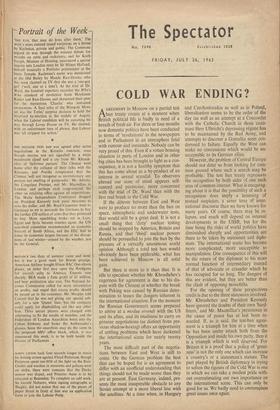COLD WAR ENDING?
AGREEMENT in Moscow on a partial test ban treaty comes at a moment when British political life is badly in need of a breath of fresh air. For three or four months now domestic politics have been conducted in terms of 'revelations' in the newspapers and in Parliament in an atmosphere fetid with rumour and innuendo. Nobody can be very proud of this. Even if a rotten housing situation in parts of London and in other big cities has been brought to light as a con- sequence, it is not a healthy symptom that this has come about as a by-product of an interest in sexual scandal. To observers abroad our state of mind appears self- centred and paranoiac, more concerned with the trial of Dr. Ward than with the first real break in the Cold War.
If the détente between East and West were to produce no more than the ban on space, atmospheric and underwater tests, that would still be a great deal. It is not a small thing that 'dirty' nuclear testing should be stopped by America, Britain and Russia, and that 'third' nuclear powers should be persuaded to join the ban by the pressure of a virtually unanimous world opinion. Although a total test ban would obviously have been preferable, what has been achieved in Moscow is all solid gain.
But there is more to it than that. It is idle to speculate whether Mr. Khrushchev's eagerness for agreement is due to his dis- pute with the Chinese or whether the break with Peking was caused by Russian deter- mination to lessen the dangers inherent in the international situation. For the moment the Russian Government seems prepared to arrive at a modus vivendi with the US and its allies, and its readiness to carry on genuine negotiations (as distinct from pre- vious shadow-boxing) offers an opportunity of settling problems which have darkened the international scene for nearly twenty years.
The most difficult part of the negotia- tions between East and West is still to come. On the German problem the best that can be hoped for is an agreement to differ with an unofficial understanding that things should not be made worse than they are at present. East Germany, indeed, pre- sents the most insuperable obstacle to any Soviet attempt at a more liberal line with the satellites. At a time when, in Hungary and Czechoslovakia as well as in Poland, liberalisation seems to be the order of the day (as well as an attempt at a Concordat with the Catholic Church in those coun- tries) Herr Ulbricht's depressing regime has to be maintained by 'the Red Army, and attempts to discover a Gomulka seem con- demned to failure. Equally the West can make no concessions which would be un- acceptable to its German allies.
However, the problem of Central Europe should not deter us from looking for com- mon ground where such a search may be profitable. The test ban treaty represents the recognition by both sides of one such area of common interest. What is encourag- ing about it is that the possibility of such a recognition does imply a lessening of mutual suspicion, a saner tone of inter- national discourse than we have known for many years. Of course, there may be re- lapses, and much will depend on internal developments, in the USSR, but for the time being the risks of world politics have diminished sharply and opportunities are there to be taken by statesmen and diplo- mats. The international scene has become more complicated, more susceptible to manipulation. One consequence of this will be the return of the diplomat to his more normal function of intermediary instead of that of advocate or crusader which he has occupied for so long. The dangers of this are evident, but they are better than the clash of opposing monoliths.
For the opening of these perspectives credit is due to the three statesmen involved. Mr. Khrushchev and President Kennedy have ignored the doubts of their own 'hard- liners,' and Mr. Macmillan's persistence in the cause of peace has at last been re- warded. If, as is said, the test-ban agree- ment is a triumph for him at a time when he has been under attack both from the Opposition and inside his own party, then it is a triumph which is well deserved. For Britain it is a proof that a policy of 'great- ness' is not the only one which can increase a country's or a statesman's stature. The part played by British diplomacy in trying to soften the rigours of the Cold War is one in which we can take a modest pride with- out overestimating our own importance on the international scene. This can only be good for us. We badly need to contemplate great issues once again.






































 Previous page
Previous page